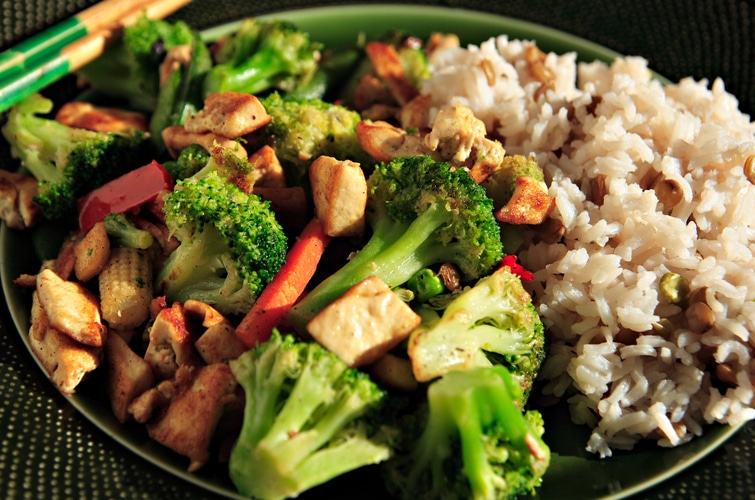If you are someone due for weight loss surgery, who failed to comply with the pre-op diet, then you are in the right place.
Bariatric surgery carries on being a means to help those who are suffering from obesity. And before the surgery, you'll be required to follow a pre-surgery diet, including a phase where only liquids are allowed. This is intended to prepare you for operation and prevent complications. But what happens if you cheat on the diet?
People, when trying to lose weight, always ask this question. There's no direct answer to this. It may be too late to bring back your metabolism and make your liver smaller if you're overweight.
But if you are in excellent shape and have a healthy lifestyle, you still stand a chance to shrink your liver to manage your health and lengthen your lifespan.
Contents
What Is A Liver Shrinking Diet?
Before you can undergo gastric bypass surgery, you must go on a special diet.
A liver shrinking plan or pre-op diet is a very low-calorie diet that is also low in carbohydrate and fat content. Bariatric patients usually have an enlarged liver because of the following reasons:
-
obesity
-
having type 2 diabetes or insulin resistance
-
having high cholesterol
-
having inflammation or hepatitis
-
excessive alcohol use
Although many detoxification organs exist, the liver is the most essential one. Surgeons generally recommend the diet 2 - 4 weeks before surgery, though some patients may have to attend to it longer if they have excess fat within and around the valuable organ.
And a few days before your gastric bypass surgery, only clear liquids are often advised, followed by nothing by mouth hours before the surgical procedure.
But if you are in excellent shape and have a healthy lifestyle, you still stand a chance to shrink your liver to manage your health and lengthen your lifespan.
Four Main Types Of Bariatric Surgery Or Weight Loss Surgery
Gastric Sleeve
The gastric sleeve is among the most popular bariatric surgery options for individuals wanting to lose weight. In this surgery, a bariatric surgeon removes a part of your stomach. The remaining small upper portion, called the sleeve, is only for carrying a small amount of liquid.
Gastric Bypass
Gastric bypass surgery involves how your stomach and small intestine manage the food you eat. The surgeon creates a small pouch that skips most of your gut and connects this straight to the small intestine.
Adjustable Gastric Band
In this procedure, a surgeon places an adjustable band around the top of your stomach, forming a small pouch to hold and limit your favorite foods.
Biliopancreatic Diversion With Duodenal Switch
This surgery combines the gastric sleeve and gastric bypass components since it changes the size of your stomach and the length of your small intestine.
How Long Is Pre-op Diet?
The length of time will vary depending on your BMI (body mass index). Bariatric surgery patients who are BMI:
-
>60: 4 weeks prior to surgery
-
60 – 51: 3 weeks
-
50 - 41: 2 weeks
-
4o - 32: 1 week
A BMI range of 18-24.9 is considered ideal.
The higher your starting BMI, the longer your pre-op diet will be. You must adhere to this diet throughout the recommended duration.
What Is The Purpose Of The Pre Op Diet?

Makes Gastric Bypass Surgery Safer And Easier
The main objective of the pre-op diet is to address problems during surgery and to maintain the patient's general well-being. During surgery, the patient is lying down, driving the liver's location directly on top of the stomach.
While the organ naturally covers a portion of the abdomen, a larger, more fatty liver can obstruct the surgeon's way when performing procedures. This can lengthen the surgery's time and thus your duration under general anesthetic.
The immediate purpose of the diet is to avoid complications after surgery.
Empties Your Stomach
This is achieved explicitly by following the 2-day liquid diet because if your stomach is full, your surgery is bound to be cancelled. A low-calorie diet is among the most efficient temporary diets.
Reduce Body Fat
Following a strict diet will force your body to use the glycogen or carbohydrate stored in your liver. This dietary regimen also pressurizes your body to consume its reserved fats, which helps you reduce weight before the surgery. It is vital to remove as much fat in your liver and abdomen as it can improve your overall safety. You'll lessen the risks if you lose a few pounds from your excess weight.
Helps Your Body Adapt to a Healthier Lifestyle
Your food selections will probably change after surgery when you start noticing the figure on the scale. Your palate will be less interested in sweet, processed, and fatty foods, and you will tend to be more excited about healthy foods.
Besides, your mindset will change. You will start to prioritize food quality instead of quantity.
The sooner you begin to make radical changes in your life, plus healthy eating habits, the more manageable your post-op life is, and the higher your post-op success rate is.
What Can I Eat On A Pre-Op Diet?
The diet patients need to follow before bariatric surgery is made of low fat, low carbohydrate, high protein foods that are usually limited to 800-1,200 calories. And mostly supplements to clear away any guesswork. Your bariatric surgeon will give you a detailed menu plan and list of approved foods.
The principal objective of following this low-calorie diet is to encourage weight loss, but the body requires a variety of nutrients to remain functional. Consequently, it is necessary to take supplemental nutrients as you follow the pre-operative plan.
When your weight loss surgery date is nearing, the most important thing to note is having your two days on a strict liquid diet. A pre-op liquid diet means there is no solid food in your body. If patients have difficulty maintaining the pre-op diet, doctors advise taking protein shakes for a few days before the two-day liquid diet.
The consumption of sugary beverages, alcoholic drinks, and full-fat dairy products is definitely prohibited.
Your doctor may order you to take specific vitamins to ensure you get the right amount of nutrients.
What Happens When I Cheat On My Liquid Diet?
Cheating on your liquid diet before gastric bypass can raise your chance of complications during and after the surgical procedure. Also, cheating makes it more difficult to establish new healthy practices that you should abide by after surgery.
Your surgeon may reschedule your surgery if you have failed on your liquid diet. The surgeon will detect that minute, at the beginning of the surgery, whether or not you went with your pre-op liquid diet. The laparoscopic camera may be able to see any food that you may have had prior to surgery. It may still be in your stomach or gastrointestinal tract.
It is relatively normal for a surgeon to reschedule a surgery by two weeks more if a patient has not been able to properly heed the liquid diet, as it may be too risky to start the procedure under the dangerous circumstances that a crucially enlarged liver presents.
What To Do If I Cheat On My Pre-Op Diet?
First of all, be honest with your surgeon. You must inform them before they start the surgery so they can explain the case clearly to you and find out if it is still alright to proceed with the procedure or postpone it. Don't be frightened of the discontinuation of your surgery. It will be rescheduled to the date you and your body are in a fit state.
Besides, this situation rarely happens because, now and then, patients cheat while on their pre-op, so there's still time to move in the right direction. Remember, every time you cheat, it heightens the risk of complications/problems during the procedure. Just let your surgeon and dietitian know. With their assistance, you can adopt the proper course to return to the pre-surgery diet as rigorously as possible until surgery.
If you cheat several times, you must tell your surgeon or dietician so they can decide the right actions to be taken. They may change your diet anyhow.
You must be mindful of the significance of following the diet that your dietician and doctor told you for your safety and health.
How To Lower The Risk Of Gastric Bypass Pre-Op Diet Cheating
Don't forget that you are on a pre-op diet for your welfare and to pave the way for your life after the weight loss procedure. It is vital to start establishing healthy habits earlier so it is not as tough after surgery.

Eat Healthy Foods
Building healthy habits before surgery improves your probability of reaching your weight loss objectives.
Refill vegetables. Chop an array of vegetables and put them in a ziplock bag with salt, pepper, and lemon juice. Eating this all day long help keep you feeling full and on target for surgery.
Eat all suggested foodstuffs on your pre-op diet menu. Do not miss a single meal or protein shakes to slim down faster.
Give away junk food or any trigger foods in your home. If you don't have much food in your refrigerator or cabinet, then there's no temptation to cheat.
Drink plenty of water to maintain the feeling of fullness and curb hunger cravings.
Use Smaller Plates
You will be eating in smaller portions before and after surgery. Thus, getting smaller plates is a breakthrough, so your plates appear more crowded during meals.
Drink plenty of water to maintain the feeling of fullness and curb hunger cravings.
Make A Grocery List
Because you won't be able to have all the foods you used to eat shortly after surgery, this is an excellent time to become accustomed to being a healthy grocery customer. See to it you have a plan and list before entering the store.
Try to stick to the outer edge at the grocery store. The store's perimeter is generally where the healthiest foods are arranged, while highly processed foods high in sugar, fats, and sodium are often on the center aisles.
Buy Handy Kitchen Tools
You may want to buy something that helps you cook foods on your pre- and post-op diets, including measuring spoons and cups, a slow cooker, and a blender. You may also search for tasty yet healthy recipes to help you consider the meals you want to make.
Consult A Dietitian
Follow the bariatric pre-op diet format your dietician made. Most dietitians offer their patients an all-inclusive diet before and after the surgery. If your dietitian gives you some broad guidelines though you want a detailed eating plan, ask them to provide you with one.
Final Thoughts
If you're thinking of bariatric surgery, you've been struggling with your weight for years. Bariatric surgery is the most suitable choice for taking a significant change in your health in a lasting way, don't disrupt the long-term success of weight reduction by cheating.
The main point is to give your best shot. While the pre-op diet can be punishing for some, it is rewarding, either temporarily or permanently. The results of committing to a pre-op diet unveil the perseverance in losing weight and keeping a healthy life even after bariatric surgery.
Consult with your doctor and dietitian for your pre-operative diet program. Adhere to the plan and make yourself ready for weight loss surgery. You'll be proud of yourself for the rest of your life for achieving what needs to be done to live a long and healthy life.






